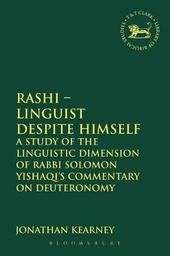
|
Rashi - Linguist despite Himself: A Study of the Linguistic Dimension of Rabbi Solomon Yishaqi's Commentary on Deuteronomy
Paperback / softback
Main Details
| Title |
Rashi - Linguist despite Himself: A Study of the Linguistic Dimension of Rabbi Solomon Yishaqi's Commentary on Deuteronomy
|
| Authors and Contributors |
By (author) Dr. Jonathan Kearney
|
| Series | The Library of Hebrew Bible/Old Testament Studies |
|---|
| Physical Properties |
| Format:Paperback / softback | | Pages:224 | | Dimensions(mm): Height 234,Width 156 |
|
| Category/Genre | Biblical studies |
|---|
| ISBN/Barcode |
9780567095589
|
| Classifications | Dewey:222.1507 |
|---|
| Audience | | Postgraduate, Research & Scholarly | |
|---|
| Edition |
NIPPOD
|
|
Publishing Details |
| Publisher |
Bloomsbury Publishing PLC
|
| Imprint |
T.& T.Clark Ltd
|
| Publication Date |
17 May 2012 |
| Publication Country |
United Kingdom
|
Description
The commentary on the Torah of the eleventh-century French rabbi, Solomon Yishaqi of Troyes (better known as Rashi), is one of the major texts of mediaeval Judaism. Rashi's commentary has enjoyed an almost canonical status among many traditional Jews from mediaeval times to the present day. The popularity of his Torah commentary is often ascribed to Rashi's skillful combination of traditional midrashic interpretations of Scripture with observations on the language employed therein. In this respect, Rashi is often presented as a linguist or grammarian. This book presents a critical reappraisal of this issue through a close reading of Rashi's commentary on the book of Deuteronomy. Falling into two major sections, Part One (Contexts) presents a theoretical framework for the detailed study in Part Two (Texts), which forms the main core of the book by presenting a detailed analysis of Rashi's commentary on the book of Deuteronomy.
Author Biography
Dr Jonathan Kearney lectured in Hebrew and Arabic in University College Dublin between 1997 and 2007. At present he lectures in Jewish and Islamic Studies in St Patrick's College, Maynooth.
ReviewsAs an introduction to appreciating Rashi's oeuvre and as a fresh look at the question of its linguistic contribution, this book is an excellent study. Kearney is to be commended for making this material available to the English-speaking public. -- Journal of Religion Kearney's book is of great importance in focusing on vocabulary as a linguistic field in which we have to re-evaluate Rashi's contribution, and in its trying to evaluate his influence on linguistics consciousness throughout the ages. -- Hebrew Studies, Volume LII
|